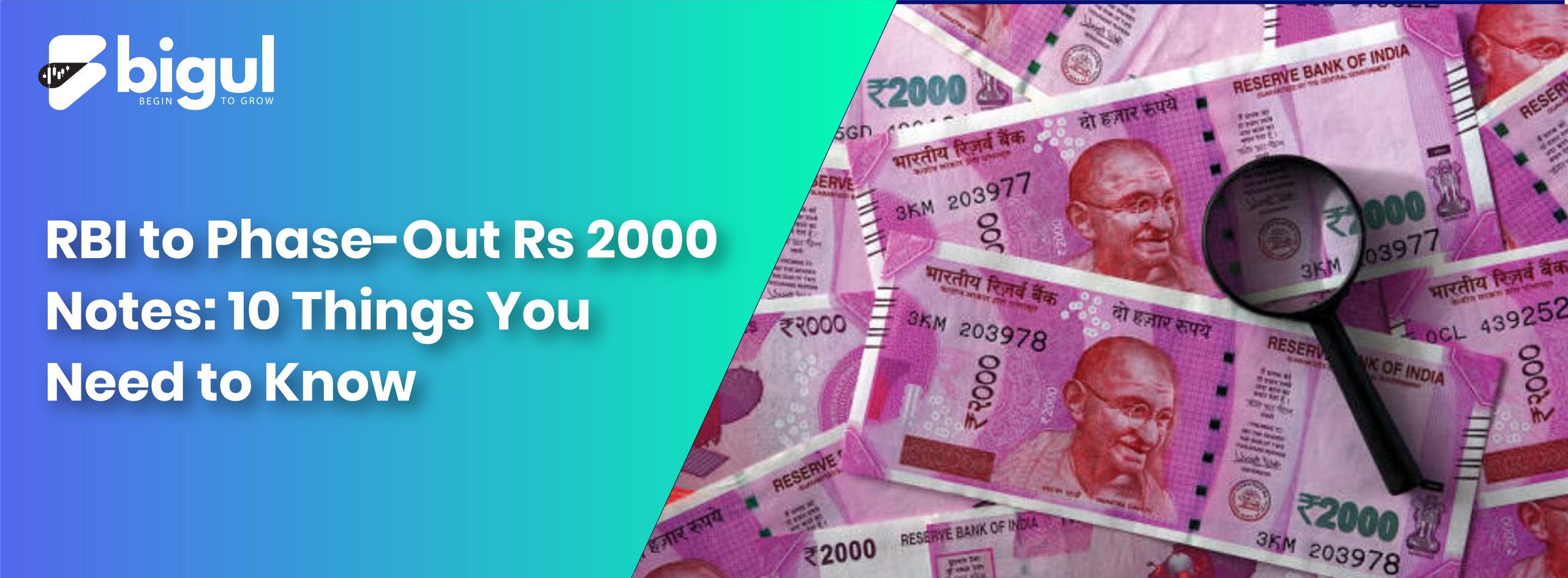RBI to Phase-Out Rs 2000 Notes: 10 Things You Need to Know
On May 19, the Reserve Bank of India (RBI) announced that it would gradually retire the Rs 2,000 denomination banknotes from active circulation under its commitment to the ‘Clean Note Policy’. It said it aims to maintain the cleanliness and longevity of Indian currency. Banks nationwide have been directed to facilitate deposits and exchanges of these notes until September 30, 2023. This measure has been triggered by a combination of factors, including the aging of the notes and their decreasing popularity in common transactions.
What Lies Ahead?
Even though RBI has decided to cease the circulation of Rs 2,000 notes, it will still be recognised as a legal currency. The central bank has also clearly mentioned that services for depositing and exchanging these notes will remain available to the public until the end of September 2023.
The Rationale Behind the Decision
In explaining the decision, the RBI stated that nearly 89% of the Rs 2,000 notes currently in circulation were produced before March 2017, meaning they are nearing their expected lifespan of around 4-5 years. Moreover, the usage of these notes for transactions has fallen drastically, with their circulation dipping from 37.3% in March 2018 to a lowly 10.8% in March 2023.
How to Handle Rs 2000 Notes?
Bank customers can deposit or exchange their Rs 2,000 notes at any banking institution. While there are no constraints on the deposit of these notes, there is a ceiling of Rs 20,000 for exchanging notes at one time, effective May 23, 2023. Furthermore, 19 RBI Regional Offices with issue departments provide exchange services.
Background of the Rs 2000 Note
The Rs 2,000 note was first introduced to cater to the demand for a higher denomination currency. Nevertheless, once lower denomination notes became adequately available in the market, the Rs 2,000 note production was discontinued in 2018-19.
Current Scenario of Rs 2000 Notes
According to recent data, around 181 crore Rs 2,000 notes are being used, making up 10.8% of the total Indian currency notes in circulation.
After September 30, 2023
According to the RBI, these Rs 2,000 notes are valid for exchange till September 2023. However, if they will be considered legal currency after the declared date is yet to be clarified by RBI. A formal announcement is expected soon.
Previous Note Withdrawals
There have been precedents of note withdrawal by the RBI. For instance, in 2014, it withdrew all banknotes issued before 2005 from active circulation.
Reasoning Behind the Exchange Limit
To maintain operational efficiency and prevent any disarray at bank branches, an upper limit of Rs 20,000 has been set for exchanging Rs 2,000 notes at banks.
The uniqueness of the Rs 2,000 Note
Distinctive in its magenta colour, the Rs 2,000 note bears the images of Mahatma Gandhi and the Ashoka Pillar emblem on the front, while the reverse showcases the Mangalyaan spacecraft and the Swachh Bharat Abhiyan logo. The dimensions of the note are 66mm by 166mm.
Impact on Cash Transactions
The withdrawal of the Rs 2000 notes could likely influence large cash transactions. As the denomination of the highest note is lowered, managing large amounts of cash may be more challenging.
Wrapping up
The move of RBI and the Indian Government to phase out the Rs 2000 notes gradually denotes a significant development in the country’s financial development. However, aspects such as the note’s legal status after September 2023 are still awaiting further clarification from the RBI. Consequently, the public is advised to stay informed about future announcements related to this matter and ensure they deposit or exchange their Rs 2,000 notes within the specified time frame to evade any potential inconvenience. This decision also implies a step ahead towards digital transactions, catching up with the global trend of a less cash-dependent economy. However, the full implications of this step by the RBI will unfold with time, but it’s important for the citizens of India to adapt accordingly.
